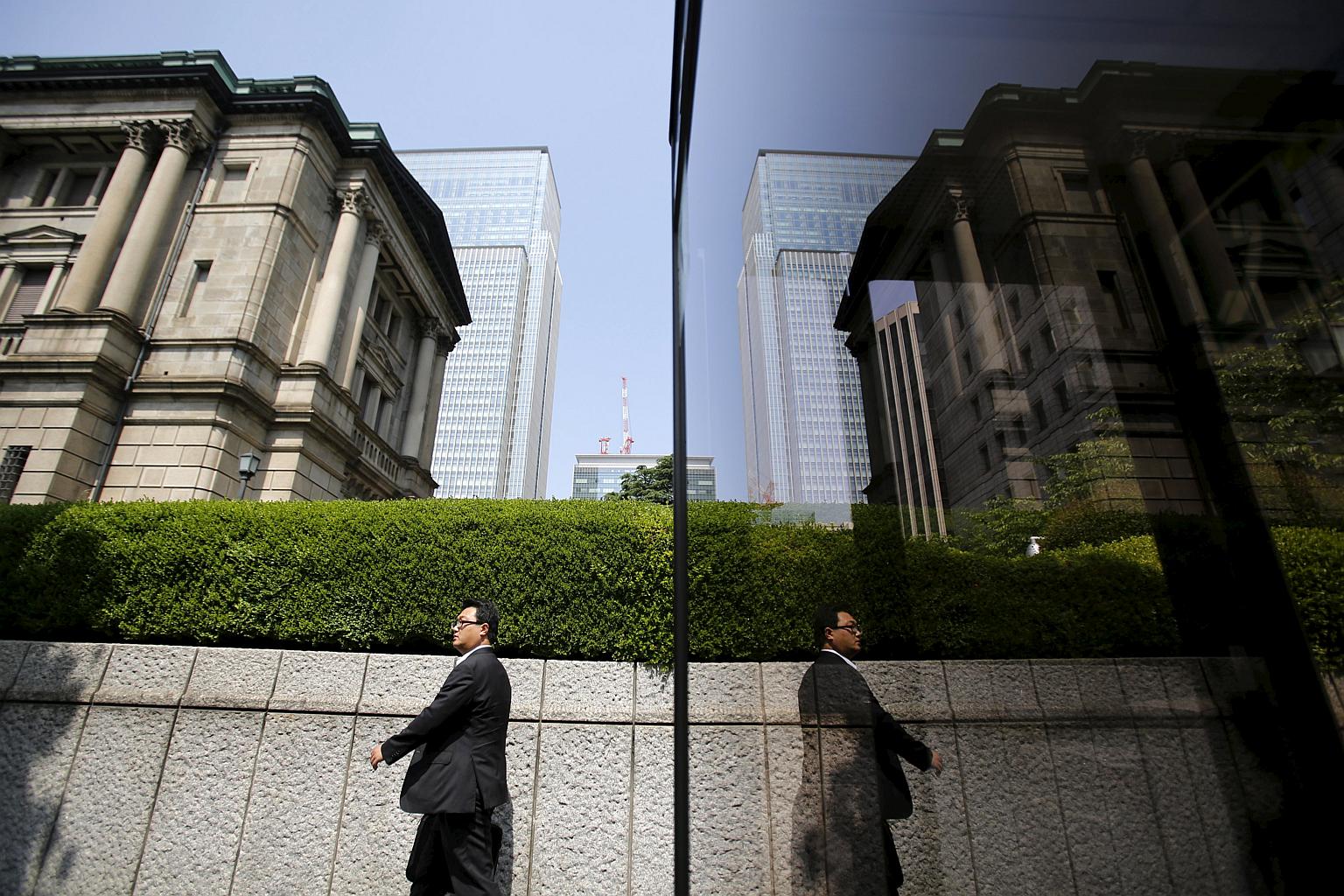Bank of Japan stuns markets by adopting negative interest rates
Sign up now: Get ST's newsletters delivered to your inbox

A pedestrian walking past the Bank of Japan building in Tokyo.
PHOTO: REUTERS
Follow topic:
TOKYO (REUTERS, BLOOMBERG) - The Bank of Japan ramped up its aggressive stimulus campaign on Friday (Jan 29), adding negative interest rates on central bank deposits to its massive asset-buying programme, stunning financial markets that expected no action or a moderate increase in asset purchases.
BOJ governor Haruhiko Kuroda had said as recently as last week that the bank was not thinking of adopting a negative interest rate policy for now, telling the Japanese parliament that further easing would likely take the form of an expansion of its massive asset-buying programme.
But in a 5-4 vote, the BOJ's policy board decided to charge a 0.1 per cent interest on current accounts that financial institutions hold with it.
The central bank said the move was aimed at forestalling the risk of global financial turbulence hurting business confidence and reviving the "deflationary mindset" it is striving to wipe out with aggressive money printing.
"The BOJ will cut the interest rate further into negative territory if judged as necessary," the bank said in a statement announcing the decision.
Japanese stocks soared, plunged then jumped again as investors struggled to decipher the central bank's surprise move.
The Topix added 1.6 per cent to 1,413.67 as of 2.05pm, gyrating between gains of more than 3 per cent and a loss of 1.6 per cent after the announcement. The Nikkei gained 1.6 per cent after similar swings.
"The market is reacting in ways which reflect their euphoric surprise and what looks, at first blush, as a big grand statement," said Stefan Worrall, director of equity cash sales at Credit Suisse Group in Tokyo. "But when you look through it, the BOJ seems to be really struggling in a convoluted way to explain how they're trying to incentivise banks to take risks rather than place their excess reserves with the BOJ. And that's the ultimate object of a negative-interest-rate environment."
The yen weakened 1.1 per cent to 119.64 per US dollar after slumping more than 2 per cent.
"The decision... suggests that the yen will weaken further against the dollar in coming months," Mr Marcel Thieliant, senior Japan economist at Capital Economics, said in a note, adding that his firm saw the dollar rising to 130 yen by the end of 2016 and to 140 yen by the end of next year.
The BOJ move also help boost other Asian markets. Hong Kong was up 2 per cent in the afternoon, Shanghai surged 2.8 per cent and Sydney ended 0.6 per cent higher. Singapore, Taipei and Manila also gained more than 1 per cent.
Only six of 42 economists surveyed by Bloomberg predicted the BOJ would expand already-record stimulus. Just one saw a reduction in the interest rate, though none saw the move to a negative rate coming.
The BOJ maintained its pledge to expand base money at an annual pace of 80 trillion yen (S$949.5 billion) via aggressive purchases of government bonds and risky assets conducted under its quantitative and qualitative easing (QQE) programme.
Slumping oil costs and soft consumer spending have ground inflation to a halt, knocking price growth further away from the BOJ's ambitious 2 per cent target.
In a quarterly review of its forecasts released on Friday, the BOJ cut its core consumer inflation forecast for the coming fiscal year beginning in April to 0.8 per cent from 1.4 per cent projected three months ago.
However, it expects consumer inflation to accelerate to 1.8 per cent in the fiscal year ending in March 2018, taking into account the effect of Friday's measures.
The decision came in the wake of data that showed household spending and output slumped in December, underscoring the fragile nature of Japan's recovery.
Consumer inflation was just 0.1 per cent in the year to December, invigorating expectations that the BOJ would eventually have to deliver further stimulus.
Many BOJ policymakers have been wary of using their diminishing policy tools to counter what they see as factors beyond their control, such as volatile financial markets and China's economic slowdown.
But pessimists on the BOJ board have worried that slumping Tokyo stocks may discourage firms from boosting capital expenditure, threatening the positive momentum the BOJ is trying to create with its heavy money printing.

